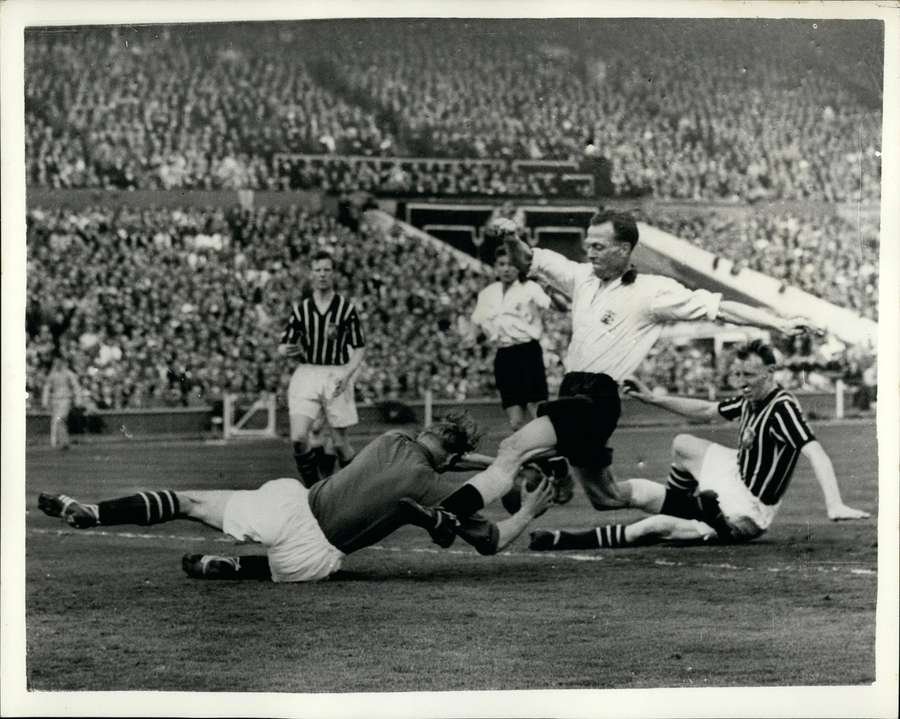On the 5th of May, 1956, Manchester City clashed with Birmingham City in the FA Cup final at Wembley Stadium. An audience of around 100,000 spectators witnessed one of the most iconic moments in the history of the world’s oldest football tournament, which first kicked off in 1872.
In the final moments of the match, Bert Trautmann, the goalkeeper for Manchester City, sustained a broken neck after a tough challenge from an opponent. Despite his grave injury, Trautmann bravely remained on the pitch and played until the end, leading his team to victory. This act epitomised his extraordinary resilience and the remarkable narrative of his life.
A Troubling War Past
Born Bernhard Trautmann in Bremen, Germany, in 1923, he grew up in a working-class family. At the age of 10, he became a member of the Jungvolk, the youth division of the Hitlerjugend (Hitler Youth). The Jungvolk aimed to indoctrinate young boys aged between 10 and 13 through activities involving outdoor pursuits, parades, and sports, all based in Nazi ideology.
As the Second World War unfolded, Trautmann enlisted in the Luftwaffe, serving as a paratrooper. He spent three years fighting on the Eastern Front, earning five medals for his service. Towards the war’s conclusion, he was reassigned to the Western Front, where he was captured by British forces.
Classification as a category ‘C’ prisoner signified that Trautmann was regarded as a staunch Nazi. He was one of only 90 survivors from his original regiment of 1,000 and was subsequently transferred to a prisoner-of-war camp in Ashton, Lancashire.
Despite the option for repatriation, Trautmann chose to stay in the area after his release in 1948, taking up farm work while also playing for a local club, St Helens Town.

Transformation from Zero to Hero
Bernhard Trautmann’s remarkable performances at St Helens earned him the English nickname Bert and drew the attention of larger clubs. In 1949, he signed with Manchester City, which at the time was a top-tier club.
However, the decision to enrol a former Nazi soldier led to significant backlash, including a demonstration attended by 20,000 people. Through persistence and stellar gameplay, Trautmann eventually gained acceptance, featuring in nearly all of the club’s 250 matches following his signing.
Renowned for his shot-stopping ability, Trautmann saved around 60% of the penalties he faced during his career. He was equally noted for his bravery, often making daring saves that showcased his tenacity.
In 1956, Trautmann was honoured with the Footballer of the Year award and played a pivotal role in securing Manchester City’s triumph in the FA Cup final—a match that remains etched in history.
Serious Injury and Other Challenges
During the 75th minute of the FA Cup final, Bert Trautmann was knocked out after colliding with Birmingham City’s Peter Murphy, who struck him in the neck with his knee. As substitutes were not allowed at the time, Trautmann, still dazed and off-balance, stayed on the pitch to complete the match.
In those last 15 minutes, he valiantly defended his goal, making several pivotal saves that contributed to Manchester City’s victory. Trautmann later admitted that he played the final stretch of the match ‘in a kind of fog.’
The extent of his injury was only revealed four days later when an X-ray showed he had a fractured vertebra, with doctors commenting that he ‘should be dead.’
Trautmann’s recovery spanned several months, causing him to miss much of the 1956/57 season. Unfortunately, this challenging time was compounded by personal tragedy, as he and his wife, Margaret, who he met in St Helens, lost their firstborn son, John, who died in a car accident shortly after the FA Cup final, at just five years old.
Bert and Margaret went on to have two additional sons, but the pain from John’s passing cast a shadow over their marriage, which ultimately ended in divorce in 1972. Trautmann remarried twice after that and passed away in 2013 at the age of 89.
The incredible tale of Trautmann’s life is compellingly depicted in the biographical film The Keeper (2018), directed by Marcus H. Rosenmuller. It’s a must-watch, not just for football enthusiasts but for everyone.
Compiled by SportArena.com.au.
Fanpage: SportArena.com.au.
LiveScore – Live Sports Results & Odds.




